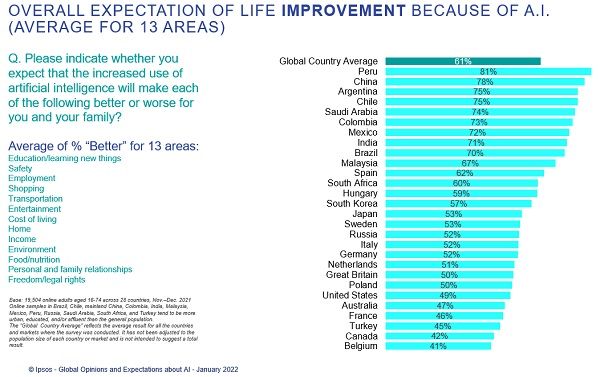
Potential uptake of artificial intelligence tested in World Economic Forum opinion survey

A new survey commissioned by the World Economic Forum shows that 60% of respondents believe that artificial intelligence will have a major impact on their lives, and that this can start happening as soon as three to five years from now.
The survey was conducted by Ipsos on behalf of the Forum, polling nearly twenty thousand individuals between 19 November and 03 December last year in the United States, Canada, Malaysia, South Africa and Turkey among adults aged 18 to 74.
“In order to trust artificial intelligence, people must know and understand exactly what AI is, what it’s doing, and its impact,” said Kay Firth-Butterfield, Head of Artificial Intelligence and Machine Learning at the World Economic Forum. “Leaders and companies must make transparent and trustworthy AI a priority as they implement this technology. At the World Economic Forum, we are focused on multi-stakeholder collaboration to optimize accountability, transparency, privacy and impartiality to create that trust. With the ability to solve many of society’s pressing issues, we are focused on accelerating the benefits and mitigating the risks of artificial intelligence and machine learning. Only then can we gain public trust and benefit from the rewards of emerging tech like AI.”
Familiarity with Artificial Intelligence:
For the purpose of this survey, AI was defined as “computers and robots doing things which traditionally require human intelligence.”
On average for all the countries surveyed, almost two-thirds (64%) of respondents claimed that they have a good understanding of what AI is, based on this definition. However only half (50%) said that they knew which types of products and services use AI.
Reported familiarity with AI varied among demographic groups, with business decision-makers (74%), those with a university degree (71%), and those in their country’s upper-income tier (71%) most likely to report a good understanding of it. On average, men were also more likely to say that they understand AI than women were.
Geographic variations were even broader. “Good understanding of AI” ranged from lows of 41% in Japan and 42% in Italy, to highs of 78% in South Africa, 76% in Chile, and 75% in Russia. Reported knowledge of which products and services use AI ranged from 32% in Japan to 76% in China.
Impact of artificial intelligence on daily life:
While a majority of global respondents agreed that AI is likely to profoundly change everyday life, certain sectors were expected to experience more noticeable levels of change than others. The areas that people expect to change the most due to AI are education and learning (cited by 35%), safety (33%), employment (32%), shopping (31%), and transportation (30%).
When asked whether AI would make their lives easier or better, respondents were more likely to be optimistic in less developed countries. For example, 76% in Saudi Arabia, and 70% in Peru agreed that AI would have more benefits than drawbacks, as opposed to only 31% in France, 32% in Canada, and 35% in the U.S.












































